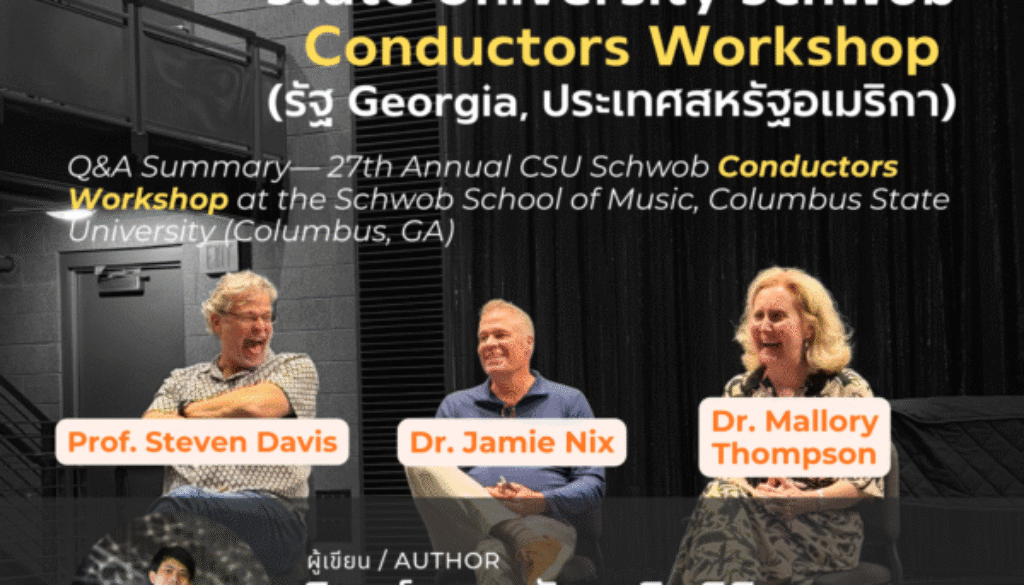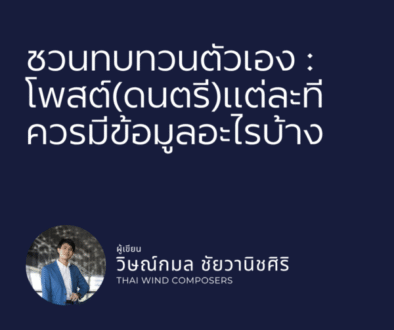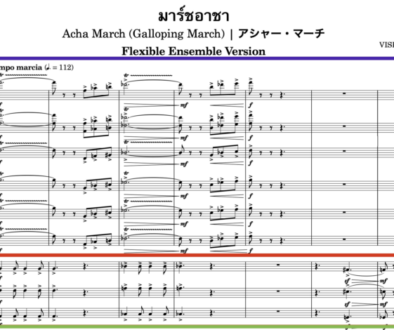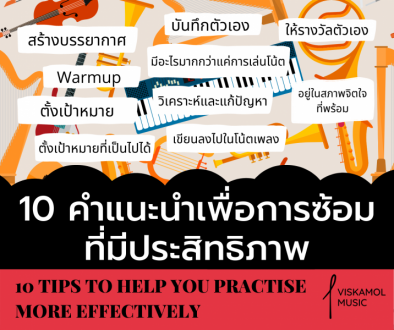ถามตอบ (Q&A): 27th Annual Columbus State University Schwob Conductors Workshop

(English Translation Below)
เมื่อวันที่ 21-22 พฤศจิกายน 2568 ผมมีโอกาสได้เข้าร่วมอบรมด้านการอำนวยเพลง (Conducting) ที่ 27th Annual CSU Schwob Conductors Workshop ณ Schwob School of Music, Columbus State University (รัฐ Georgia, ประเทศสหรัฐอเมริกา) โดยหนึ่งในไฮไลท์กิจกรรมคือช่วงถาม-ตอบ (Q&A) กับวิทยากรได้แก่ Dr. Mallory Thompson (Northwestern University) Steven Davis (University of Missouri-Kansas City) และ Dr. Jamie Nix (Columbus State University) ผมรู้สึกได้รับแรงบันดาลใจเป็นอย่างมากจากกิจกรรมนี้ เลยสรุปข้อมูลคำถามมาเล่าให้ทุกคนได้อ่านกันครับ
จิตวิทยาการซ้อมรวมวงและแนวคิดเกี่ยวกับบทเพลง (Rehearsal Psychology & Repertoire)
เวลารวมวงจะรู้ได้อย่างไรว่าเมื่อไหร่ควร “ไปต่อ” ไปซ้อมในจุดอื่นๆ
วิทยากรให้ความเห็นว่าเป้าหมายของการซ้อมคือการ “เก็บรายละเอียดให้ได้มากที่สุด” (Collect as much as possible) แต่ต้องไม่แลกมาด้วยขวัญกำลังใจของวง
- ประสิทธิภาพ: กำหนดจุดมุ่งหมายในการซ้อมแต่ละครั้ง และต้องรู้ว่าเมื่อไหร่ที่เราบรรลุเป้าหมายของช่วงนั้นๆ แล้ว และควรขยับไปสู่จุดถัดไป
- การสร้างพลัง (Empowerment): อย่าทำให้นักดนตรีรู้สึกแย่กับการทำไม่ได้ตามเป้าหมาย แต่ควรสร้างบรรยากาศให้เขารู้สึกว่าเขาสามารถทำได้ดีกว่านี้
ควรทำอย่างไรเมื่อต้องอำนวยเพลงที่ไม่ได้ชอบ
- พยายามหาจุดที่ชอบ: พยายามหาจุดที่ชอบเกี่ยวกับเพลงนั้นให้เจอ ไม่ว่าจะเป็นดนตรี บรรยากาศ หรือ อารมณ์เพลงแล้วยึดจุดนั้นไว้เป็นหลักเพื่อสามารถสร้างแรงบันดาลใจต่อนักดนตรีได้
- ความเป็นมืออาชีพ: “อยู่กับมันให้ได้” (Live with it) ในขณะเดียวกันเรายังต้องซื่อสัตย์กับวงดนตรี โดยการพยายามทำให้พวกเขาสนุกไปกับการซ้อมถือเป็นการฝึกความเป็นมืออาชีพอย่างหนึ่ง
- การศึกษาค้นพบเพิ่มเติม: ถ้ามองให้ลึกพอ เรามักจะเจออะไรใหม่ๆ ในสกอร์เพลงเสมอ ดังนั้นการศึกษาสกอร์และเนื้อหาเกี่ยวกับบทเพลงจึงเป็นเรื่องที่สำคัญ
วิทยากรมีความเห็นต่อมุมมองต่อบทเพลงเรียบเรียง (Transcription) อย่างไรบ้าง
- ซื่อสัตย์ต่อต้นฉบับ: พยายามเล่นให้ใกล้เคียงกับต้นฉบับให้มากที่สุด และควรมีสกอร์ต้นฉบับประกอบการศึกษาสกอร์เสมอ
- บทบาทหน้าที่: หลังจากที่ศึกษาสกอร์ต้นฉบับแล้ว เราอาจสามารถคิดได้ว่าเรามีความสามารถมากพอๆ กับผู้เรียบเรียง (Arranger) อย่ากลัวที่จะตัดสินใจทางดนตรีบางอย่างแล้วแก้ไขโน้ตฉบับเรียบเรียง (เพิ่มเติมโดยผู้เขียน: หนึ่งในบทเพลงในการแสดงคอนเสิร์ตของงานอบรมนี้คือ Nimrod โดย E. Elgar อาจารย์ Mallory Thompson ตัดสินใจตัดโน้ตฉาบออกจากฉบับเรียบเรียงเนื่องจากในต้นฉบับไม่มีโน้ตฉาบ)
- ผลกระทบต่อการศึกษา: ท้ายที่สุดแล้ว เราควรเลือกเพลงที่ส่งผลดีต่อนักเรียนเพื่อส่งเสริมทักษะการเรียนรู้ที่ดีเกี่ยวกับเครื่องดนตรีนั้นๆ และ เพิ่มพูนความรู้ด้านดนตรีของนักเรียน
เส้นทางอาชีพ: ก้าวแรกในสถาบันการศึกษา
วิทยากรทั้งสามท่านได้แบ่งปันเรื่องราวเกี่ยวกับงานสอนงานแรกของตนเอง และแนะนำวาทยกรรุ่นใหม่ว่าเส้นทางนี้ไม่ได้เป็นเส้นตรงเสมอไป
- Mallory Thompson เล่าถึงการทำ “หลายอย่าง” ในงานแรก ทั้งคุมวงโยธวาทิตและวงแจ๊ส โดยได้รับเงินเดือนไม่สูงนัก ปรัชญาของอาจารย์เรียบง่ายคือ “ฉันรักทุกงานที่ฉันทำ” (I love every job I have) และมุ่งมั่นทำงานหนักจนกว่างานจะสำเร็จ
- Steven Davis แนะนำว่าเราไม่มีทางรู้ว่าสุดท้ายแล้วเราจะไปอยู่ที่ไหน ให้ทำทุกงานเสมือนว่าเป็นที่ที่เราจะอยู่ตลอดไป “ทำงานให้หนัก วางแผนเหมือนจะอยู่ที่นั่นตลอดไป” อาจารย์เตือนใจว่านักเรียนในทุกๆ ที่ ไม่ว่าจะสถาบันไหน ก็สมควรได้รับสิ่งที่ดีที่สุดจากเรา
- Jamie Nix แนะนำในช่วงเริ่มต้นใหม่ว่าคือ “จงทำหลายๆ สิ่ง” เรียนรู้จากการเฝ้าสังเกตผู้คนและเก็บเกี่ยวความรู้จากผู้อื่น
การรักษาแรงบันดาลใจและสุขภาวะ (Wellness)
จะทำอย่างไรเมื่อรู้สึก “หมดไฟ”
- เปลี่ยนบริบท: พาตัวเองไปอยู่ในสถานการณ์ที่สร้างแรงบันดาลใจ หรือในทางกลับกัน คือไปอยู่ในห้องที่เราไม่ต้องรู้สึก “ถูกจ้องมอง” (Exposed)
- วิธีของ Jamie Nix: เขาฝึกเล่นกีตาร์ไฟฟ้าเพื่อรีเซ็ตตัวเอง (กีตาร์ไฟฟ้าไม่ใช่เครื่องดนตรีที่อาจารย์เล่น) จากประกบการณ์นี้ทำให้อาจารย์เข้าใจมุมมองของนักเรียนที่เริ่มต้นเรียนเครื่องดนตรีใหม่มากขึ้น และ สามารถให้คำแนะนำที่ดีต่อไปได้
- วิธีของ Steven Davis: เขาอ้างถึงเหตุการณ์ในวันแสดงคอนเสิร์ตว่าอาจารย์ “ลืมย้อนห้องในเพลง Candide” บทเรียนคือ เราต้องให้อภัยตัวเองได้ และ ต้องเลือกที่จะเป็น “เวอร์ชันที่ใหญ่กว่าของตัวเราเอง” (Bigger version of yourself)
คุณค่า (Value) และความจริงใจสำคัญอย่างไรต่ออาชีพวาทยกร
- Jamie Nix: เราต้องซื่อสัตย์ต่อดนตรี ต่อตัวเราเอง และไม่ “ตอแหล” (Can’t be a BS-er) ดนตรีที่ดีที่สุดเกิดจากการที่เราเป็นคนจริงๆ (Real person) และแสดงให้เห็นว่าเรารักดนตรีนั้นแค่ไหน
- Steven Davis: การกระทำของเราต้องสอดคล้องกับความเชื่อของตนเอง
- Mallory Thompson: เวลานั้นผ่านไปเร็ว เราเป็นคนเดียวที่ตัดสินใจได้ว่าอะไรสำคัญสำหรับชีวิต ดังนั้นเราต้องหาเวลา “เช็คอินกับตัวเอง” เสมอ ในขณะที่อาจารย์พูดอาจารย์ได้ไปที่กระดานแล้วเขียนแผนผัง ด้านบนคือภาพตนเองในอนาคต และ ด้านล่างคือตนเองในปัจจุบัน แน่นอนว่าในชีวิตเรามักจะมีการผันเปลี่ยนไปมาเสมอ หากเรายึดถือคุณค่าและจริงใจต่อตัวเอง ไม่ว่าชีวิตจะผันเปลี่ยนอย่างไร เราจะยังคงไปหาเป้าหมายในอนาคตได้เสมอ
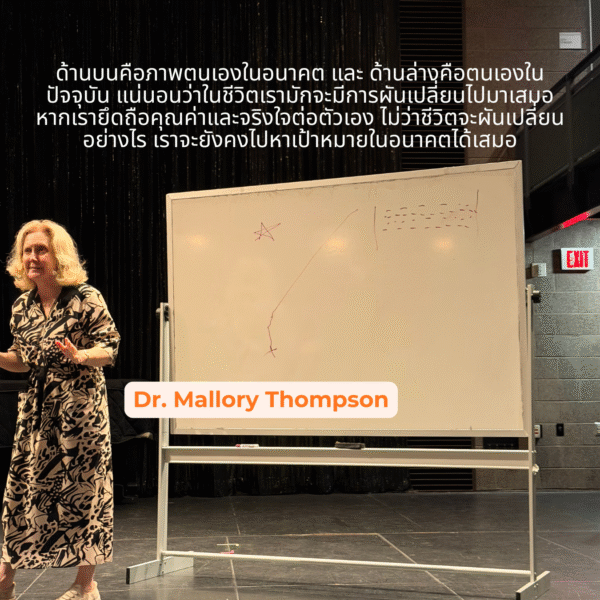
คำแนะนำสำหรับผู้ควบคุมวงรุ่นใหม่
- อย่าโดดเดี่ยว: อย่าแยกตัวออกมา (Don’t isolate) จงใจดีต่อตนเอง (Be kind to yourself) พยายามหา “คนที่เชื่อมั่นในสิ่งเดียวกัน” สักคน คนที่เราสามารถแชร์ความคิดเห็นของตนเอง สามารถเป็นตัวของตัวเอง และ แบ่งปันเล่าเรื่องของตนเองให้ฟังได้
- การสังเกตการณ์: เข้าไปดูห้องซ้อมของวงอื่น และสังเกตวิธีทำงานของคนอื่น
- รับมือกับสิ่งไม่คาดฝัน: Steven Davis กล่าวว่าเรื่องไม่คาดฝันเกิดขึ้นตลอดเวลา สิ่งสำคัญไม่ใช่ เกิดอะไรขึ้น แต่คือ คุณตอบสนองอย่างไร “ในสถานการณ์ที่แย่อาจมีเรื่องดีซ่อนอยู่ (Silver lining) และในสถานการณ์ที่ดีที่สุดก็อาจมีเมฆหมอกปะปนอยู่ได้เช่นกัน” จงอยู่กับปัจจุบัน (Be present)
สรุป
สำหรับตัวผมเองแล้วที่ได้เข้าฟังการถามตอบนี้ ประเด็นใหญ่ที่คำตอบส่วนใหญ่มีเหมือนกันคือ การซื่อสัตย์ต่อระบบความเชื่อของคุณค่าตนเอง (Value system) เราให้ความสำคัญต่อเรื่องอะไร ทำไมเราถึงเลือกทำอาชีพนี้ เราจะสามารถทำงานร่วมกับนักดนตรีของเราได้อย่างไร เราจะสามารถเป็นแรงบันดาลใจต่อนักเรียน/นักดนตรีของเราอย่างไรได้บ้าง ผมเห็นด้วยกับอาจารย์ Mallory Thompson เป็นอย่างยิ่งต่อเรื่องการหาเวลา “เช็คอินกับตัวเอง” กับอาจารย์ Jamie Nix กับเรื่องการเป็นตัวเอง ไม่พยายามเป็นคนอื่น และ อาจารย์ Steven Davis กับเรื่องการอยู่กับปัจจุบัน หวังว่าทุกท่านจะได้รับประโยชน์และแรงบันดาลใจจากบทความนี้นะครับ
On November 21-22, 2025, I had the opportunity to attend a conducting workshop at the 27th Annual CSU Schwob Conductors Workshop at the Schwob School of Music, Columbus State University (Columbus, GA). One of the highlights was the Q&A session with the clinicians: Dr. Mallory Thompson (Northwestern University), Professor Steven Davis (University of Missouri-Kansas City), and Dr. Jamie Nix (Columbus State University). I felt greatly inspired by this session, so I have summarized the questions to share with everyone.
Rehearsal Psychology & Repertoire
How do you know during a rehearsal when it is time to “move on” to other spots?
The clinicians opined that the goal of rehearsal is to “collect as much as possible,” but this must not come at the expense of the ensemble’s morale.
- Efficiency: Set a goal for each rehearsal, know when you have achieved the goal for that specific session, and then move on to the next point.
- Empowerment: Do not make musicians feel bad about not meeting a target; instead, create an atmosphere where they feel they are capable of doing better.
What should you do when you have to conduct a piece you don’t like?
- Find a bright spot: Try to find something you like about the piece—whether it is the music, the atmosphere, or the emotion—and anchor yourself to that point to inspire the musicians.
- Professionalism: “Live with it.” At the same time, we must be honest with the ensemble. Trying to make them enjoy the rehearsal is a form of professional practice.
- Further discovery: If you look deep enough, you will often find something new in the score. Therefore, studying the score and the content regarding the piece is crucial.
What are the clinicians’ views on transcriptions?
- Respect the original: Try to play it as close to the original as possible, and always have the original score available for study.
- Role/Function: After studying the original score, we might realize that we are just as capable as the arranger. Don’t be afraid to make musical decisions and edit the transcribed notes. (Author’s addition: One of the concert pieces at this workshop was “Nimrod” by E. Elgar. Dr. Mallory Thompson decided to cut the cymbal notes from the transcription because the original did not have them.)
- Educational Impact: Ultimately, we should choose pieces that have a positive effect on students, promoting good learning skills regarding their instruments and enhancing their musical knowledge.
Career Path: The First Step in Academia
All three clinicians shared stories about their first teaching jobs and advised young conductors that this path is rarely a straight line.
- Dr. Mallory Thompson spoke about doing “many things” in her first job, including directing marching band and jazz band, with a modest salary. Her philosophy is simple: “I love every job I have,” and she commits to working hard until the task is accomplished.
- Prof. Steven Davis said that “you never know where you’ll be”. He advised treating every job as if it is the place where you will stay forever. “Work hard; plan like you’ll be there forever.” He reminded us that students everywhere, at every institution, deserve the best from us.
- Dr. Jamie Nix suggested that for new beginners, his advice is “do many things,” learn by observing people, and harvest knowledge from others.
Maintaining Inspiration and Wellness
What to do when feeling “burned out”?
- Change context: Put yourself in situations that create inspiration, or conversely, go to a room where you don’t feel “exposed.”
- Dr. Jamie Nix’s method: He practiced electric guitar to reset himself (an instrument he didn’t play). This experience helped him understand the perspective of students starting a new instrument and allowed him to give better advice.
- Prof. Steven Davis’s method: He cited an event during a concert where he “missed a repeat in Candide.” The lesson is: We must forgive ourselves and choose to be a “bigger version of ourselves.”
How important are values and sincerity to the conducting profession?
- Dr. Jamie Nix: We must be honest with the music, with ourselves, and “can’t be a BS-er.” The best music comes from us being real people and showing how much we love that music.
- Prof. Steven Davis: Our actions must align with our beliefs.
- Dr. Mallory Thompson: Time passes quickly. We are the only ones who can decide what is important in life. Therefore, we must always find time to “check in with ourselves.” While speaking, she went to the board and drew a diagram: the top was the future self, and the bottom was the current self. Naturally, life fluctuates. If we hold onto our values and are true to ourselves, no matter how life changes, we can always navigate toward our future goals.

Advice for New Conductors
The session concluded with advice for new teachers and handling the unexpected.
- Don’t isolate: Don’t separate yourself. Be kind to yourself. Try to find someone who “believes in the same things”. Someone with whom you can share your opinions, be vulnerable, and share your stories.
- Observation: Go into other ensembles’ rehearsal rooms and observe how others work.
- Handling the unexpected: Prof. Steven Davis stated that unexpected things happen all the time. The important thing isn’t what happens, but how you respond. “In bad situations, there may be a silver lining, and in the best situations, there might be some clouds.” Be present.
Conclusion
For me personally, having attended this Q&A, the major theme shared across most answers is honesty to one’s own Value System. What do we prioritize? Why did we choose this profession? How can we work with our musicians? How can we inspire our students/musicians?
I strongly agree with Dr. Mallory Thompson regarding finding time to “check in with yourself,” with Dr. Jamie Nix regarding being yourself and not trying to be someone else, and with Prof. Steven Davis regarding living in the present. I hope everyone finds value and inspiration from this article.
